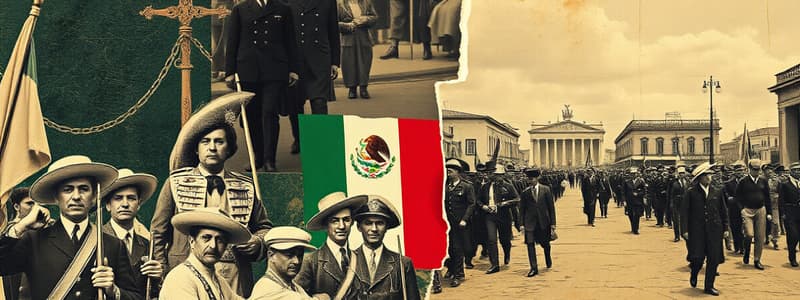Podcast
Questions and Answers
What were some of the main causes of the Mexican Revolution related to social issues?
What were some of the main causes of the Mexican Revolution related to social issues?
- Class divide (correct)
- Land ownership (correct)
- Political corruption
- Economic opportunity (correct)
What was the economic condition in Mexico that contributed to the revolution?
What was the economic condition in Mexico that contributed to the revolution?
Poverty and failing economy
The upper class in Mexico had both economic and political advantages over the lower class.
The upper class in Mexico had both economic and political advantages over the lower class.
True (A)
What characterized the Porfiriato regime's approach to the lower class?
What characterized the Porfiriato regime's approach to the lower class?
What role did Madero play in the revolution against Diaz?
What role did Madero play in the revolution against Diaz?
Who was Victoriano Huerta and what was his association with the revolution?
Who was Victoriano Huerta and what was his association with the revolution?
What was Villa's approach to land reform?
What was Villa's approach to land reform?
What slogan did Zapata use as an agrarian revolutionary?
What slogan did Zapata use as an agrarian revolutionary?
Flashcards are hidden until you start studying
Study Notes
Causes of the Mexican Revolution: Social Factors
- Significant class divide in Mexico, where a majority belonged to the working and poor class, while a small elite controlled resources.
- Rich continued to accumulate wealth while the poor remained impoverished, creating widespread frustration and anger.
- Land ownership was concentrated among the upper class, limiting opportunities for the poor to improve their socio-economic status.
Causes of the Mexican Revolution: Economic Factors
- The lower class was primarily employed on haciendas owned by the wealthy, perpetuating a cycle of poverty.
- Economic failure was exacerbated by the conditions imposed on the poor, leading to increased frustration and contributing to the revolutionary uprising.
Causes of the Mexican Revolution: Political Factors
- Political power was held by the wealthy minority, who controlled laws that served their interests, further marginalizing the lower classes.
- Wealth equated to political influence, making it nearly impossible for those without land to effect change, deepening resentment towards the elite.
Role of the Porfiriato Regime
- The Porfiriato Regime favored the economically stable and neglected the needs of the poor, leading to heightened tensions.
- Lack of support for lower-income citizens fueled discontent and the eventual decision to initiate the revolution.
The Revolution and its Leaders: Madero's Ideologies and Actions
- Madero emerged as a prominent critic of Diaz, believing in liberal political reform while supporting Diaz's economic policies.
- He sought the presidency in 1910, running against Diaz's control, leading to his imprisonment and the creation of the Plan of San Luis Potosi.
- Madero's plans called for the annulment of the 1910 elections and provisions for free elections, leading to his eventual presidency in 1912.
- His government faced challenges, particularly regarding land reform advocated by Zapata, and internal conflicts with aides and military leaders.
Victoriano Huerta
- A former general for Diaz, Huerta gained power through a coup and was not recognized by U.S. President Woodrow Wilson.
- He aimed to restore a Diaz-like regime but struggled to maintain control amidst increasing opposition.
- Forced into exile by revolutionary forces, including Zapatistas and Pancho Villa, Huerta faced arrest during his later attempts at regaining power.
Pancho Villa
- Villa was an agrarian revolutionary advocating for land reform, proposing that confiscated land should benefit government-led redistribution post-revolution.
- He gathered support from small ranchers and unemployed individuals, forming a well-equipped professional army that posed a significant threat to Carranza.
Emiliano Zapata
- Zapata, an agrarian revolutionary, famously championed the slogan "Tierra y Libertad" (Land and Liberty).
- He represented landless peasants and demanded the return of land taken during Diaz's regime.
- Disillusionment with Madero led Zapata to formulate the Plan de Ayala, highlighting his commitment to agrarian reform and social justice.
Studying That Suits You
Use AI to generate personalized quizzes and flashcards to suit your learning preferences.



